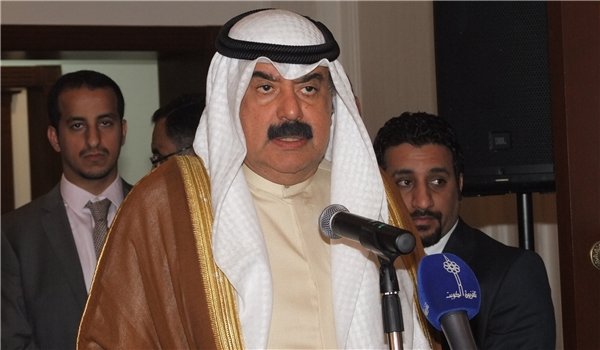Kuwait expresses optimism over Arab-Iran ties

TEHRAN – The Kuwaiti Deputy Foreign Minister has expressed optimism over the future of relations between Iran and the Arab states of the Persian Gulf, saying foreign ministers of the Persian Gulf Cooperation Council will meet on Thursday to discuss holding talks with Iran.
“We hope that the talks between Tehran and the Persian Gulf Cooperation Council (PGCC) will resume soon,” Khaled al-Jarallah told reporters on Sunday.
“We will take further steps after the Thursday meeting,” he said.
Kuwait was one of the first countries to take the initiative to defuse tensions between Iran and predominantly Shi'ite Iran and the Sunni Arab-dominated Persian Gulf countries, notably Saudi Arabia, which support opposing sides in conflicts in Syria and Yemen.
In January, Kuwaiti Foreign Minister Sheikh Sabah Khaled al-Sabah made a rare visit to Tehran in two years to deliver a message to Rouhani on a “basis of dialogue” between Arab states and Iran.
Days following the meeting, a spokesman with Iran’s Foreign Ministry told a press conference in Tehran that the Iranian government was mulling a response to the reconciliation overture.
Mid February Iranian President Hassan Rouhani made a one-day formal trip to Kuwait and Oman, seen as his first reconciliation push to fill a diplomatic gap between Iran and the Arab world.
On March 13, Rouhani sent a letter to Kuwait's ruler, Emir Sheikh Sabah al-Ahmad al-Sabah delivered by Iran's ambassador, as confirmed by the country’s state news agency IRNA.
Kuwait state news agency Kuna said al-Sabah received Alireza Enayati in his palace and "during the meeting a letter was delivered addressed to His Highness ... from Rouhani".
Less hostility between Iran and Arab states will make inroads into the beleaguered Middle East.
Efforts to restore peace to the region have failed so far.
On January 17, Iranian President Hassan Rouhani said at least 10 countries had offered mediation to lessen the escalating feud.
One main cause, people familiar with the issue say, is the political standoff between Tehran and Riyadh over a list of issues.
Relations between the two have deteriorated over the past few years.
Riyadh and certain other Arab states claim that Iran interferes in Arab countries by fueling sectarianism to expand its sphere of influence in the sensitive region. Tehran denies any interference in the region.
Tensions between Saudi Arabia and Iran have particularly reached levels unseen since the 1980s, where most Arab countries took side with Iraq after it waged a war against Iran, which lasted for nearly eight years.
Irrespective of ideological discrepancies, Tehran and Saudi Arabia do not agree on the situation in Syria.
Backing President Bashar al-Assad unfailingly, Iran opposes demands by Saudi Arabia and other Arab states that Assad should step down.
As archrivals, Tehran and Riyadh have had no political relations for a little more than a year after Riyadh summoned its diplomats from Tehran in the aftermath of attacks on its diplomatic missions in Iran by angry mobs.
The storming came after Riyadh's execution of Sheikh Nimr al-Nimr, an outspoken opponent of the Saudi kingdom.
NA/AK
Leave a Comment